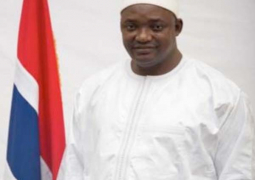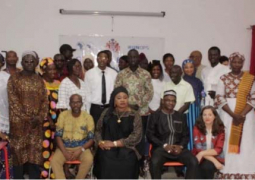The Gambia's Environmental Action Plan (GEAP) Phase II was recently launched, at a ceremony held at the National Environment Agency's office along Jimpex Road.
The Second Edition of the State of the Environment Report-The Gambia was also launched, at the same ceremony.
In a statement read on his behalf by Lamin Kaba Bajo, the Minister of Fisheries, Water Resources and National Assembly Matters, on the inauguration of the programme, President Jammeh said that his government will continue to encourage and engage the private sector and other development partners in the sustainable use of the country's natural resources.
President Jammeh noted that the sustainable management of our environment and natural resources is the cornerstone for any meaningful development, adding that public awareness of environmental issues, as well as community participation in the planning and implementation of environmental management schemes has increased the understanding of the citizenry.
"In line with Vision 2020, the PRSP and the MDGs, my government will continue to encourage and engage the private sector and other development partners in the sustainable use of our natural resources, particularly during the implementation of development projects or other similar activities," he said.
President Yahya Jammeh, who is also the Chairman of the National Environment Management Council, pointed out that he would never allow greed and the scramble for profits, to destroy livelihoods and the lives of the Gambian people.
According to him, it is for this reason that he had given clear directives that all development projects must obtain approved Environmental Impact Assessments (EIAs) or be stopped.
"It should make no difference whatsoever, whether these projects are government-driven or privately owned," he stated.
Taking stock of the major environmental achievements since the establishment of the National Environment Agency in 1994, he said, the National Environment Management Act (NEMA) was enacted by the National Assembly, to create the National Environment Management Council (NEMC), as the highest policy making body for environmental management.
He added that over the last 16 years, since its establishment, the NEA has been steadfastly pursuing the integration of environmental consideration in all development projects.
"Over the years, a functional institutional framework for the implementation of the GEAP I and the sustainable management of the environment has been developed. The National Environment Agency, guided by the National Environment Management Council, has established an effective process of building constituency and advocacy in sound environmental management," he said.
"Climate change and biodiversity issues have also received increased prominence in our actions at national level. As our country is extremely vulnerable to the negative impacts of climate change, there will be increased focus on adaptation actions to protect the lives and livelihoods of our people," he noted.
Other speakers included Lamin Nyabally, the Permanent Secretary at the Ministry of Forestry and Environment, who spoke on behalf of the Minister of Forestry and Environment, Momodou B Sarr, the Executive Director of National Environment Agency (NEA) and Dr. Chinwe M Dike, UNDP Resident Representative.
Read Other Articles In Article (Archive)

French: Gambie: le président Adama Barrow lance sa formation politique
Jan 2, 2020, 2:22 PM

BAC commits to Greater Banjul 2040 Shared Vision Declaration
Mar 13, 2020, 2:20 PM


